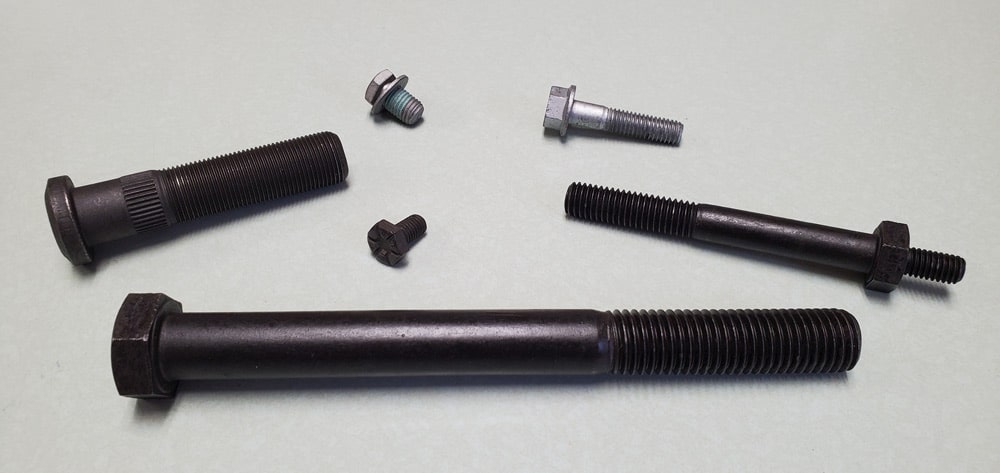If you work in the automotive industry, you know how important choosing the right fastener is for ensuring the safety, durability, and high-quality performance of a vehicle — but you may also know how difficult that can be.
With so many different types of fasteners working to produce and service so many different models of cars, it’s easy to get a little lost. To help clear some things up, let’s discuss some of the most common types of automotive fasteners and what they might be used for.
Common Types of Automotive Fasteners
While virtually any type of fastener could be used in an automotive application, there are some that get put to use a little more frequently than the rest. Below is a short list of them, along with some examples of their functions within the automotive industry.
Nuts
Nuts feature interior, or female, threading. In automotive applications, they’re often utilized to secure the attachment of bolts and screws to a given surface. Lug nuts, for example, are auto-specific nuts that fit over bolts and help attach the wheel of a vehicle to its axle.
Bolts
Bolts are externally threaded fasteners, and they’re commonly designed for insertion through the holes in assembled components. They’re known for having great versatility, strength, and durability. When it comes to automotive applications, there are a couple of bolt subtypes that are seen most frequently, including:
- Hex head bolts, which feature six-sided hex caps on one end.
- Hex flange bolts, which feature washers on the underside of their hex heads, which helps distribute force from bearing loads more efficiently.
- Carriage bolts, which feature reduced body diameters and domed, enlarged heads.
- Place bolts, which feature self-locking, free-spinning hex heads that heavily prevent loosening due to vibration.
- Wheel bolts, which feature threaded bodies and tapered heads that match wheel inserts.
Washers
Washers are usually small, flat discs with holes in their centers. In automotive applications, they’re used to hold several bolts, which, in turn, helps to prevent leakage, distribute pressure, and secure radiators.
Studs
Studs are externally threaded fasteners that typically look like and operate as threaded bars. Most of them are threaded at both ends, allowing them both to be paired with nuts.
One of the most common stud subtypes used in automotive applications is the wheel stud. Wheel studs often have ribbed bodies that hold the studs in place when they are pressed into a hole on a wheel assembly.
Screws
Screws are externally threaded fasteners that aren’t usually compatible with nuts, so they’re tightened and released by torquing their heads. They have pretty general applications in the automotive industry, being used to secure various different components.
Specialty Fasteners
And then, of course, there are specialty fasteners — the kinds of fasteners that you won’t be able to find in a hardware store or use in a wide practice application. They’re designed and manufactured for certain industries, applications, and materials.
In the automotive industry, original equipment manufacturers (OEMs) use specialty fasteners when they need a unique part for a certain application. In most cases, these specialty fasteners are first tested to ensure they’ll perform well once the vehicle hits the market — which leads us to the next section…
Fasteners Used for Automotive Test Products
Aside from the common manufacturing and servicing parts listed above, there are also many fasteners used for testing within the automotive industry. These fasteners are for testing only, so they aren’t ever used in vehicles. However, they’re a huge help for engineers and manufacturers to ensure that automotive fasteners are installed with the correct amount of torque.
Torque is the amount of force used when tightening a fastener. Too little, and the fasteners can loosen over time; too much, and you risk high amounts of fastener stress that can lead to failure — two things that you don’t want to happen to the car you drive back and forth to work every day.
That said, the tests we’re talking about here are all related to determining the correct amount of torque needed to achieve the desired amount of tension in a joint. They’re also used to analyze the performance of different fastener platings and coatings, as those have an effect on friction and torque as well. These tests usually include one or more of the following:
- Torque-Tension – Torque-tension testing measures the input torque required for a bolted joint to achieve a specified tension.
- Bearing Surface – Bearing surface testing measures how much the amount of surface area and roughness will affect friction.
- Coefficient of Friction – Coefficient of friction testing measures the kinetic and static resistance of one surface being dragged across another.
RELATED: Need a specialty bolt, screw, or stud? Wilson-Garner can help.
Automotive Test Products at Wilson-Garner
At Wilson-Garner, we manufacture a variety of test products that aren’t specific to a certain OEM or brand. However, we’ve also partnered with a few popular names in the automotive industry, supplying them with test products built to their unique engineering standards and specifications. Currently, we work with the following organizations:
- Chrysler
- Ford
- GM
- John Deere
- ISO (specifically ISO 16047)
Need a limited-run, specialty fastener for your automotive application? Wilson-Garner can help! Our team has extensive knowledge and years of experience manufacturing a range of unique, American-made automotive fasteners, including test products for big industry brands like Ford, GM, and John Deere. Contact our team to learn more about what we can do for you.

